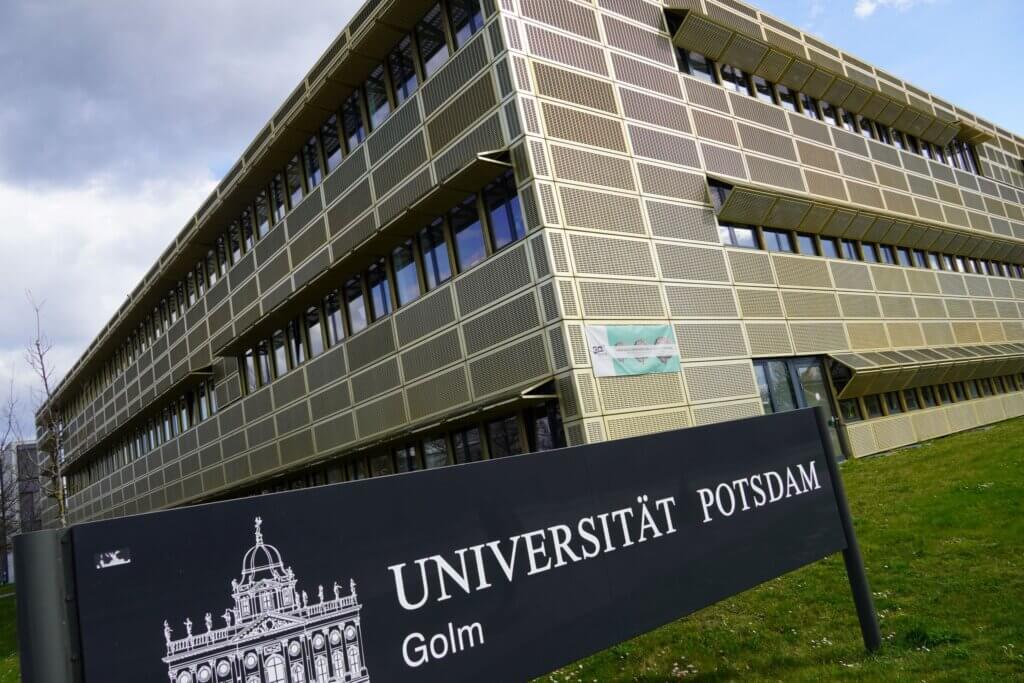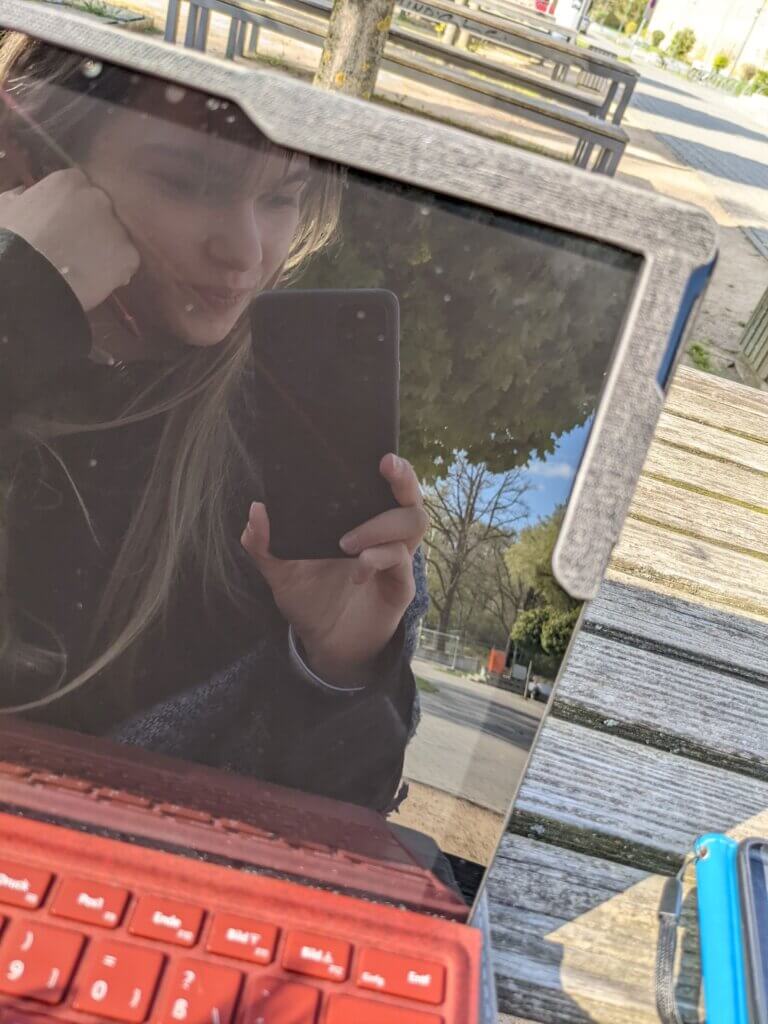Reading time: 14 minutes

LIFE STORIES I worked on this article during the whole second semester of my university life. Here are my feelings and thoughts, learning plans and everyday impressions. You will get to know the great aspects of a summer semester as well as negative impressions. And you will see that in the life of a student not everything always goes according to plan.
Way too many emails! I just checked my university mailbox and was flooded with messages regarding course enrollments, deadlines, etc. Inside, I’m not ready for all this self-organization stuff. Six weeks without any thoughts about university are behind me. And after all, the lectures don’t start for a few days. Whereas … I know, actually I’m late in slowly getting used to the idea of studying again.
All beginnings need goals
My friends are already dealing with complicated mathematics in ThePhy pre-course (Theoretical Physics) this week. Since I decided against taking the ThePhy course this semester due to time constraints, I have been spared this. Of course, I will catch up on the course in a later semester, but for now I am happy about my relatively empty schedule.
Finally, the courses are to take place in presence without exception. Although COVID-19 is still the talk of the town, the measures have recently been relaxed, so hopefully we will now experience real university life. I have set myself a lot of goals and would like to avoid all the mistakes of the first semester and get the best and most effective out of my time:
- I will work more intensively with my two main courses MaPhy (Mathematics for physicists) and ExPhy (Experimental Physics) and still spend less time with university
- I will allow myself my free time and also incorporate my hobbies and extracurricular activities firmly into my schedule in order to have a good weekly structure.
Summer feelings
No one can describe how different the summer semester is from the winter semester until they experience it for themselves. The atmosphere on campus is completely different. An empty, tired campus has become a loud, colorful, happy gathering. The campus shines in the most beautiful shades of green, plants are blooming everywhere, the sun is shining and makes relaxed studying under one of the many trees possible. A huge swarm of students from the trains overruns the paths in the morning, real crowds line up at the canteen, here and there people sit in the green grass, again and again old acquaintances greet each other who have not seen each other for a long time.

On the one hand, this may be due to the longer days and the (still) pleasant temperatures, which simply put people in a good mood. But it may also be due to the fact that we finally have a real semester of attendance again. Thus, the first Campus Festival in years can take place on the Campus Neues Palais. There are participatory games, a bouncy castle obstacle course, music, a stage program, and numerous booths from clubs and local student groups.
At one of the booths, students are asked to write their feelings on a canvas during the Corona restrictions (last winter semester) and afterwards (current summer semester). The result shows – not surprisingly – an extreme relief to be free from the COVID-19 restrictions. have never seen so many people in one pile since the beginning of the pandemic. And for the first time it’s actually not funny anymore to walk around without a mask.
In general, there is an indescribably beautiful atmosphere. I enjoy strolling along the booths and watch all the interactions of the many students around me with great interest, while a friend of mine picks up all kinds of giveaways and sweets. And as I sit with her among the many groups of students on the lawn in front of the stage, I realize: this is exactly how I imagined student life in Potsdam to be, and nothing else.
Picnic blanket
The learning atmosphere has also changed. When you wake up to the first rays of sunshine in the morning before the alarm clock rings, it’s immediately more fun to start the day – unless it’s Tuesday and we have a highly abstract MaPhy lecture at eight o’clock. Then getting up is not quite as much fun. But otherwise …
I don’t sit in my apartment for hours on end over some task, but often squat outside on my picnic blanket in the afternoon. With cookies (= nerve food) within reach and my laptop on a small transportable “laptop table” I sit cross-legged under a tree on a small meadow in the middle of campus.
Here I can spend hours working on my lab books or racking my brain on the latest MaPhy assignments. In between, I let my mind wander and observe the people around me, greet passing students I know or listen to the conversations of others, especially when they talk about me, the girl kneeling alone on a huge picnic blanket, as they often do.
Here and there, other students sit on the grass on the lawn – in groups or alone. Mostly unabashed, they discuss university projects or simply enjoy their free time before the next lecture. But hardly anyone stays there as long as I do. I don’t think that’s a bad thing. I have no problem sitting there by myself. In fact, I really love these hours. Because then I hear the birds chirping, get annoyed by pesky bugs (I can’t stand bugs at all, unfortunately) and almost feel like I’m sitting at home in our courtyard – with the difference that there are always other students around and I’m never completely alone.
Studying as a full-time job
There hasn’t been a second yet that I’ve regretted dropping ThePhy. I am already at my concentration and performance limit with my 21 credit points. Theoretically, we are supposed to work through 30 credit points per semester in order to complete our degree in standard study time. One credit point corresponds to 30 working hours. That makes 30 x 30 = 900 working hours per semester. With 15 weeks in a semester, that’s nine working hours per day, six days a week. That’s an insane amount of time! I mean, compared to the normal 40-hour work week…
I’m just realizing how much pressure I put on myself just a few months ago. Like, I’m going to get through university in regular time. I was so sure I could achieve this goal with my good absorption capacity and ambition. I wish someone had told me before I started studying how such a course of studies works. How I would organize my whole daily life according to my studies. How I would stay up late into the night to turn in my assignments on time each week. How I would feel bad for every minute I didn’t spend solving unfinished assignments.
At the moment, I spend four to eight hours a day working on university stuff. And I am more than busy with that. So in addition to the things that have to be done anyway (cooking dinner, cleaning the apartment, travel times, doctor’s appointments …), I can also take time with a clear conscience for things I like to do: meeting friends, doing sports, pursuing hobbies, planning trips, dozing off. I don’t want to sacrifice all my time and mental health to studying. I want to enjoy my studies and learn a lot, but at the same time I want to fulfill myself in as many other areas of interest as possible.
By no means the rule

When I see what the daily routine of some of my fellow students looks like, I wouldn’t want to change places with them. I sometimes find it very admirable how they manage their schedules; however, I have noticed for myself how much happier and more liberated I am when I don’t have so much to do. I’ll gladly give up the 30 credit points to be earned for that. And quite honestly: No one bothers! The standard period of study (three or four years, depending on the course) is by no means the rule. And this has been confirmed by every student I have talked to so far.
This is not only due to the extreme amount of time required, which is too much for some students, but often also due to failed exams, which can often only be made up a year later. Or you have to take overbooked modules (i.e. 500 students choose a module that is designed for 300 people). So you don’t even get into all the modules and accordingly don’t manage 30 credit points per semester.
I find it sad to have learned this lesson the hard way. Sure, maybe that’s just part of being a student. In the end, I learned a lot about myself and my own limitations during the first semester… But now that I have a comparison of how much more enjoyable student life can be without the excessive pressure of assignments, I never, but really never want to go back to 30 credit points per semester.
Understanding takes time
First of all: If you want to study physics, you need perseverance and a lot of patience. Patience in the sense that you can’t understand everything on the first or second read-through, like in school. I have to work through the MaPhy script alone several times until I halfway understand the statements. However, it sometimes takes months (or years :/) until I understand a topic completely. I’m not kidding. Sometimes you sit in an exercise months later, talking about an earlier topic, and suddenly it clicks in your head and you think: Oh, I see! Now I know what this is for anyway.
I think it’s important to understand that this lengthy thinking and learning process is absolutely normal. “Not understanding things right away doesn’t mean you’re stupid.” A phrase I’ve said to myself a hundred times. It took me a while to realize it: Physics is not about memorization. It’s about concepts that you have to think through yourself over and over and over again in order to see them through. This also involves mathematical methods that you simply have to internalize. All of this does not happen overnight.
For me this means: The first time I hear about the Exphy learning material is during the lecture. There I understand, if it comes well, at least the concepts. Then I sit down for another one to three hours (or longer) per lecture to follow up by rereading the current material in a book recommended by the professor and completing my notes. For a practice paper, I sit for a whole day if I follow through, so about six to eight hours. Then the mathematical correlations in particular become even clearer to me – even if I don’t get all the problems solved in the same way.
In the exercises with exercise leaders, we all have to recalculate at least twice. Most of the time, however, you just sit there and are happy when the solutions on the board match your own. But again, you don’t get everything – and only by working through the uploaded sample solutions, the (probably not yet) last uncertainties are cleared up.
Bad conscience
It is similar in MaPhy. Sometime during the first weeks I started to do intensive preparation for the lectures. To do this, every week I write down almost the entire script for the coming week (except for the proofs), which takes me on average two to four hours. Then I sit in the lectures, understand – if it goes well – about half of it and already calculate in my head how many hours I will have to put into the follow-up.
Sometimes you need several hours per exercise (and there are several of them…) – depending on how important it is to you to really get the tasks solved independently. Because as strange as it sounds, sometimes a student just needs to stare at a formula for 60 minutes to understand it. And if that doesn’t work, there are always the study groups and finally the practice sessions. Phew, so that’s at least five “runs” per week per module … and I haven’t even mentioned the exam overviews or cheat sheets that we’re allowed to make again …
“I can take time off without having a guilty conscience, because I still manage the material (almost) without stress.” Well. Right now I’m sitting in a math exercise, but I’m barely listening because I have already solved that one problem well for myself. Anyway: I don’t know when I wrote down the above quote. It must have been a while ago, though, because by now it’s no longer true that I can still do the material (almost) without stress.
I haven’t done Spanish in a few weeks. I have to force myself to do it every free evening. Yes, it’s definitely better than the first semester. I’ve already learned a bit to pay more attention to my mental health. But until I’m really happy with the workload (maybe that’s not even possible…), there’s still a long way to go.
Efficiency

Every now and then there are days when I feel like I’ve been sitting on study stuff all day and haven’t accomplished anything of what I wanted to do. Somehow the motivation was missing, but the sense of duty wasn’t and so I struggled for hours through the various preparations and post-processing. It’s hard to stay in a positive mood on such evenings.
But then I always try to tell myself WHAT I have accomplished today instead of listing everything I have not accomplished. Not: “Now I haven’t looked at the math problems again, nor have I started with the ExPhy problems.” Rather, “Cool! Another ten pages of MaPhy script copied out! And I never knew as much about electromagnetic waves as I do now!” I think my point is getting across. (And now I really need to continue working on my assignments instead of writing this article, though …)
In order to achieve the best possible learning outcomes and to work as effectively as possible, there are a variety of options in studying. Personally, I love to work out content on my own. To do this, I bought a few of the books recommended by the professors and older students and sometimes sit for hours on a question because I would so much like to find a solution myself.
Only when I’m really stuck, it’s nice to be able to exchange ideas with other fellow students – or to despair together over assignments (which are the funniest moments during the week). Many of my fellow students work much more as a team. They basically solve tasks together, explain things to each other. And I mean, that’s the great thing about studying, isn’t it? Everyone can learn in the way that is most comfortable for them.
Tutoring
I know, for example, that for my fellow students the explanations of our tutor, let’s call him Sam, are essential for their understanding, while I actually only go to tutorials to get approaches to seemingly unsolvable tasks. Then I sit there between the other students, who discuss animatedly with Sam about the most different topics. I just listen with half an ear and listen up when Sam says something interesting for me; but actually write most of the time on this article. Or I’m working on other tasks that occupy my brain more right now … like the Zoom lecture material with our ExPhy professor, who LITERALLY has to be in Crete right now due to a conference.
POV: There I sit once in the tutorial and listen, even write along and then fellow students ask why the Lagrangian function is now the way it is. What is the intention behind this question? I mean, the formula works and we have proved that it holds. If you want to know more about the background, you have to read a book, don’t you?
You see, when I do something for university, I want to do it efficiently. Especially now when I feel like I’m falling behind my schedule again. So if we effectively discuss approaches to solutions and do exam preparation in the tutorial, I’m happy. But when questions come up that don’t have much added value for me, I switch off and start writing this, for example.
Lecture-free
During the last weeks of lectures, it is an immense relief not to still be studying for two upcoming exams at the same time like the others. ThePhy exam is cancelled for me, and the ExPhy first date has been placed by our professor, with the agreement of the majority of our class, in what should be an exam-free August. As usual, I am in the minority; after all, our vacation for exactly this period has been booked long ago. So I have no choice but to rely on the second date at the end of September.
Long story short: While the others spend almost all of their time preparing for the exam, I get off much better in terms of time and effort. I’m also stressed out, so it’s not like that. I really want to get my math review done before the first vacation. And that’s not an easy undertaking. It takes me at least two hours a day to write out the most important bullet points from my semester notes.
Before I know it, August is be upon us and the summer semester is be over. I’m a little sad because there’s so much I didn’t do. Going out partying in Berlin, for example. A picnic in Park Sanssouci with summer hats and summer dresses. A spontaneous evening with university friends. But of course I’m looking forward to summer. We would fly to Turkey and stay at the Defne Star, our regular hotel in Side, for perhaps one last time. Two weeks of heat. Only the thought that two more exams awaited me would stand in the way of complete relaxation.
Tu parles le langage des mathématiques?

Back home, I immediately start writing my cheat sheet with the help of my bullet points. Again, it’s an elaborate plan – after all, I have to squeeze an entire semester’s worth of math knowledge onto two A4 pages. I know that most of my fellow students only write down the most important points of the mathematical procedures that will most likely be covered in the exam. But you know me. I have to be prepared for everything.
During these few days, I get distracted quickly. I spend hours watching YouTube videos or reading up in my books because mathematical connections keep popping up that don’t quite make sense to me. I don’t quite make my schedule, and when I fly to Paris with my grandma for a few days at the end of August, my cheat sheet isn’t finished.
Paris is everything my MaPhy course can be sometimes: Crazy, colorful and, above all, confusing. When we return from the City of Love after an exciting, exhausting week, I have no time to rest. There’s still a week to go until the MaPhy exam and I haven’t solved a single practice problem. But it actually doesn’t take long until my cheat sheet is finished and the two mock exams are calculated.
In peace I dedicate myself to the script of Sam, our tutor, in which he has summarized the most important points of this math semester for us (so to speak as a farewell gift) and explained them with examples. Next year we will no longer have a tutor and will be on our own. I’m excited to see what we get up to. Because even though I wasn’t always a fan of Sam’s tutorials, I can only recommend to every student: Take advantage of the tutorials! An older student’s perspective is always worth listening to.
MaPhy study plan
4-8 weeks before: independent research on old and current math topics; trying to really get through the content; summarizing all content in as short "bullet points" as possible
3 weeks before: writing on my cheat sheet, looking at old assignments
1 week before: calculate many, many tasks
1 day before: relax - now I can't expand my knowledge much anyway
Surprises
I approach the math exam with a queasy feeling. Not because I didn’t feel up to it. But rather because I’m back in Potsdam after what feels like so many weeks and I see all my fellow students again. Because I’ve almost forgotten what it’s like to walk across campus.
The exam turns out to be very surprising compared to the mock exams. I have never heard of most of the tasks. And the time is also short. “Don’t be afraid of the tasks,” I hear the words of our professor, “just do it and then you’ll get it right.” I get it done. Barely two weeks after the exam, I receive my result: 2.0. I would never have expected that.
Early September. I “treat” myself to an additional two-day seminar at Neues Palais: “Journalistic Writing.” We are a very small class, so we can work individually and listen to the experiences and stories of our seminar leader. This little insight into the world of journalists is more than worthwhile. Especially since we also get the opportunity to write our own journalistic text. I decide to do a mini-research on the topic of “Double burden: studying and working”, the result of which you can read here.
Crazy September

I now have three and a half weeks to study before the ExPhy exam on September 29. And they are urgently needed. Until the end of the month I have to go through all my notes, solve all exercises again and the mock exam and have my digital cheat sheet ready. And I want to keep the last week free for any additional problems that come up. A tight plan. To follow it through, I work through the knowledge of a semester week every day according to the following scheme:
- handwrite a summary of all important aspects of this week (my self-created script is 54 pages long in total) *2 hours*
- using this script, design my crib *1-2 hours*
- solve the exercises of this week with the help of the crib and make clear all connections *2-3 hours*
That makes a total of six hours of effort per day. A turbo-repeat, so to speak, squeezing all of a semester’s worth of knowledge into my head in two and a half weeks. My plan works surprisingly well for the first two weeks. It’s a lot of work, no question, and feels like a full day’s work every time. But I also have time to go out and take a little bit of liberty with the semester break.
Things only go wrong when, a week before the exam date, my COVID-19 test is positive. Great. My biggest fear at this point is that I wasn’t negative again by the time of the exam, so I missed the second date and had to retake it next year. I’m missing out on a whole four days of preparation, just lying at home sick and annoyed at not being able to prepare adequately.
Tension
I’m all the happier when my symptoms slowly get better and my concentration finally allows me to solve the mock exam. And tadaa! The mock exam doesn’t cause me any problems, my logical thinking works again. That makes me a little calmer. Now another day and a half to clear up a few uncertainties and then I can start on Thursday – hopefully – into my second and last exam of this semester.
I can see the tension in the faces of my fellow students as I set out on my way to the exam on exam morning. I know, for most here, this is already the second attempt. But I can’t help but get a little excited about the next two hours. It’s always a great feeling to sit in front of unknown tasks and have to find a solution under time pressure.
Admittedly. Most of the tasks are a bit TOO unfamiliar to me, too, and I get quite sweaty. But somehow I am able to twist my head a little bit more with each task and manage to solve most of them – especially since I copy two answers almost completely from my cheat sheet.
Questions, but no answers
The first days after the exam are weird. I suddenly have nothing to do. Two weeks without any pressure from the university. What do you do with your time when before everything was focused on these two exams that are now over? I’m working on my Spanish and making surprisingly good progress. Finally, I can dedicate time to this blog again. I’m meeting great people, going to parties, surprising myself all the time. When else do I have the opportunity to drive from Potsdam to Wittenberg in the middle of the night with a good friend to go to a party there, because the box office is not open at the party in Potsdam?
Soon I have to take care of the module registrations for the new semester. That’s actually a welcome change, because it can be fun to put together a schedule. In the process, I accidentally discover my ExPhy exam score: 1.3. Tears come to my eyes because my hard work has paid off. I’m a little worried about next semester, though. The modules in the first two years of the bachelor’s program are very interdependent. That’s why my plan to de-stress my study life by skipping modules then leads to a dead end.
And I’ll be honest: I don’t know what I’m going to do about it yet. Is there perhaps a way to decouple all of this a bit? Or do I do an internship in journalism instead of the fourth semester? In my case, is a physics degree even career-wise? Far too many questions and the longer I think about it, the more question marks appear in my head. Where will this study lead me?

New adventures at Potsdam University
What has happenend in the next semesters?
- Live or study? – The highs and lows of my first exam phase (2022)
- Semester 3 & 4 – Being on the same (Compton) Wavelength
- The normal madness and the joys of cycling – semesters 5 & 6
- Quantum, cows and paleoclimate – An update on my 7th semester
- Four years of bachelor’s studies—a dignified end?
- Light quanta and sunburn – An introduction to quantum physics 2024
- Double Burden – Studying and working in Potsdam in 2022
- The World of the DPG 2021 – Physics, Journalism and Me

